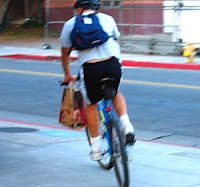Mega-tippers threaten to catapult service workers into living wage
The United States Department of Labor on Tuesday called
attention to a disturbing new trend that some claim is upending the nation’s
job market: hyper-tipping.
A CNN/Payscale.com survey reveals that the national average
for tipping is a mere 10.3% across all service categories from babysitters to
waiters and valets, a segment of the population that depends heavily on tips to
make ends meet.
But since last summer, reports surface at least twice a week
about restaurant and coffee shop servers who are given stratospheric tips by
customers who want to help them in some way: let their family take a trip, get
a car, or care for an ailing parent.
Just last week two men gave a cheerful young Cracker Barrel
waitress in Nebraska $6,000 to help her with college, and a someone who calls
himself “Tips for Jesus” has been, according to an unnamed source, “throwing
money around like a drunken apostle” throughout the holiday season.
“I’ve heard that Johnny Depp and Brad Pitt and Drew
Barrymore are really generous for good service,” said former McKeesport, PA
waitress Angela Boyd, 25. “I’m
always grateful for 15-20%, but one time Bill Murray came in our restaurant and
left one of the girls $500. That
was really cool.”
WalMart chief business officer Robert “Duke” Wayne says hyper-tipping puts stress on all segments of the economy. “When waitressing and carwash work look like a career path,
it puts the pressure on business to pay more than minimum—and benefits, even—just to stay
competitive. It’s a recipe for
disaster. Some of them even think
they can afford lodging and food. We don’t want to see another 2008.”
“It’s edging [service workers] perilously close to a living
wage,” said Ned Kilpakyan, a Republican congressman from northern
California. “We can’t stand idly
by and watch this situation unfold—we have a duty to stop it.”
Kilpakyan also cited instances when servers had been
“stiffed,” inspiring sympathetic strangers to send money. One such waitress, who was left nothing
by a diner except an insulting note about her weight, received about $8,000
from anonymous donors. “I eat out eight, nine times a
week, so I know they’re making a good
living at waiting tables,” Kilpakyan said. “This extra income presents a dangerous push toward
financial independence.”
“This is a trend that poses serious problems for the economy,”
said Fin Kilpatrick, editor of OURS magazine, a conservative weekly. “If people keep helping waitresses by
leaving huge tips, it’s like feeding a cat. They just come back for more.”
“I know a housekeeper at a local hotel who was left $300.00
by the guest. That’s criminal,”
Kilpatrick continued. “So what did
she do? Went out and bought Christmas presents for her kids. You start asking yourself what’s the point? These people need to be shown how to
manage money.”
“People leave
these huge tips,” said Kilpakyan, shaking his head. “Then the waitress turns
around and spends it on shoes or dental work or something.”
Boyd eventually put her tips toward going to college, where
she received a teaching credential.
She began working as a math teacher at a Philadelphia middle school last
fall, which has pressed her into taking an evening job as a waitress.





Comments
Post a Comment
I welcome and appreciate your comments, both positive and constructively negative. Feel free to speak your mind!